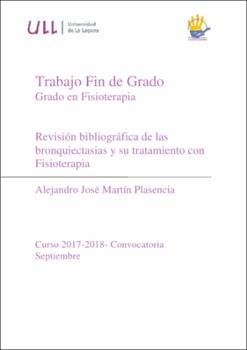Revisión bibliográfica de las bronquiectasias y su tratamiento con Fisioterapia
Fecha
2018Resumen
INTRODUCTION: Bronchiectasis (BQ) is a permanent dilatation of the bronchial tubes with obstruction of the airways and is considered the most frequent chronic inflammatory airway disease after COPD and asthma. OBJETIVE: To analyze with a bibliographic review, the characteristics of the BQ and its treatment with physiotherapy. MATERIAL AND METHODS: A literature search of studies and clinical trials of the last 5 years in English and Spanish was conducted. Studies that analyzed the effectiveness of respiratory physiotherapy techniques in the treatment of BQ was selected. The search was performed in the PubMEd, PEDro, PuntoQ and Google Academic databases. RESULTS AND DISCUSSION: Eight articles were selected that analyzed the effectiveness of the physiotherapy interventions and the characteristics of the BQ. The interventions for the management of secretions were: slow expiratory techniques, autogenous drainage, prolonged slow expirations, the active cycle of breathing, percussion and postural drainage. The instrumental techniques mainly PEP and Vest Airway Clearance System. A single review of exercise training called Pulmonary Rehabilitation was found. CONCLUSION: The treatment of BQ with physiotherapy interventions achieves an increase in the secretions expelled, contributes to a more productive cough, with less effort and discomfort and therefore improves the quality of life. Pulmonary rehabilitation, with training programs guided by physiotherapists, also improves the quality of life and capacity for exercise. Studies that endorse the scientific evidence of these interventions are required. INTRODUCCIÓN: La Bronquiectasia (BQ) es una dilatación permanente de los bronquios con obstrucción de las vías aéreas y se considera la enfermedad inflamatoria crónica de la vía aérea más frecuente tras EPOC y asma. OBJETIVO: Analizar con una revisión bibliográfica, las características de las BQ y su tratamiento con fisioterapia. MATERIAL Y MÉTODOS: Se realizó una búsqueda bibliográfica que comprende estudios y ensayos clínicos publicados en los últimos 5 años en inglés y español. Se seleccionaron estudios que analizaran la efectividad de las técnicas de fisioterapia respiratoria en el tratamiento de BQ. Las bases de datos fueron: PubMEd, PEDro, PuntoQ y Google Académico. RESULTADOS Y DISCUSIÓN: Se seleccionaron 8 artículos que analizaban la efectividad de las intervenciones de Fisioterapia y las características de las BQ. Las intervenciones para el manejo de secreciones fueron: técnicas espiratorias lentas, drenaje autógeno, espiraciones lentas prolongadas, el ciclo activo de la respiración, la percusión y el drenaje postural. Las técnicas instrumentales principalmente PEP y Vest Airway Clearance System. Se encontró una única revisión sobre entrenamiento al esfuerzo denominado Rehabilitación pulmonar. CONCLUSIÓN: El tratamiento de BQ con intervenciones de fisioterapia consigue un aumento de las secreciones expulsadas, contribuye a una tos más productiva, con menos esfuerzos y molestias y por tanto mejora la calidad de vida. La rehabilitación pulmonar, con programas de entrenamiento guiados por fisioterapeutas, también mejoran la calidad de vida y capacidad para el ejercicio. Se requieren estudios que refrenden la evidencia científica de dichas intervenciones.





